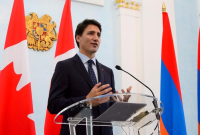Support strong Canadian climate journalism for 2025
Prime Minister Justin Trudeau is reassuring Canadians the country is indeed ready to become the first G7 member to greenlight legal recreational pot — a campaign pledge that will become reality in a matter of hours.
Canada has a system that is failing, Trudeau said Monday, adding it does not protect young people or communities from organized criminal involvement in the marijuana trade.
"This is why we're in the process of legalizing it," Trudeau said on Parliament Hill.
Come Wednesday, Canadians 18 or 19, depending on the province or territory, will be able to buy and use cannabis legally — a drug even Trudeau has admitted to enjoying while it was illegal.
But the dramatic legal and policy shift — and all changes set to flow from it at the federal, provincial and municipal levels — comes with political risks, says pollster David Coletto.
Coletto, CEO of research firm Abacus Data, said Monday his work has shown the majority of Canadians are supportive of pot's legalization but he noted there are implicit political risks associated with shifts of this magnitude.
"For everyone's entire life, this has been seen as something that is prohibited, that is illegal, that will get you in trouble if you consume it and get caught to now overnight going to be legal," Coletto said in an interview. "I think (that) is risky."
Canadians will be watching the execution of cannabis legalization, Coletto said, noting the federal Liberals are the "high-profile initiators" of change and may be blamed for anything that goes wrong.
"I think the real risk, beyond just people becoming opposed to this over time is that because they're the ones who initiated it, the federal government could become blamed for a problem that's actually local."
Canadians remain unsure about what will happen, Coletto added, noting people don't have a clear sense of rules and regulations around cannabis in their own backyards.
For their part, police forces have also raised concerns about elements of the unknown including the effects of drug-impaired driving.
Organized Crime Reduction Minister Bill Blair, a former police chief himself, said Monday he understands "the anxiety" associated with the significant change.
But he said the government has provided tools to make roads and communities safe.
There is a consensus across the country that more needs to be done to protect children and to displace the illicit marijuana market, Blair added.
Conservative House leader Candice Bergen said Monday the federal government has rushed legalization, pointing to uncertainty at the Canada-U.S. border and provincial and municipal concerns as evidence that Canada isn't ready.
NDP Leader Jagmeet Singh said Monday he is supportive of legalization but his party wants the federal government to expunge Canadians' criminal records for simple pot possession.
He said the lack of action will "weaken" an otherwise positive step taken by the government, suggesting it calls into question the progressive elements of the decision.
The government has said it will address the issue of criminal records for past pot infractions only after legalization.





Comments